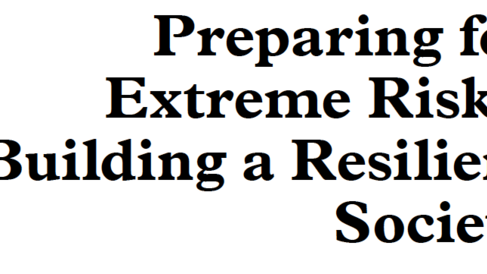
The Select Committee on Risk Assessment and Risk Planning appointed by the House of Lords included Professor Lord Robert Mair, Founding Head of CSIC, who cited the report and response during his opening address at the CSIC Partner Strategy Day on Friday 18 March.
The Select Committee on Risk Assessment and Risk Planning was appointed by the House of Lords in October 2020 to 'consider risk assessment and risk planning in the context of disruptive national hazards'. The Committee issued a call for evidence, which received 99 pieces of written evidence and, between 25 November 2020 and 23 June 2021, heard oral evidence from 85 witnesses during 29 sessions. The findings were published on 3 December 2021 in the report ‘Preparing for Extreme Risks: Building a Resilient Society’ which made recommendations across a number of chapters bringing focus to: the UK risk landscape, resilience, a whole society approach, risk assessment, and risk planning.
The Government’s response is very positive and to be welcomed – it accepts, at least in principle, most of the recommendations in our report. Professor Lord Robert Mair, Founding Head of CSIC
The Select Committee report states: “Our inquiry has concluded that the UK must be better at anticipating, preparing for and responding to a range of challenging scenarios, including those which it has never experienced before. The Government’s current strategy of centralised and opaque risk assessment and risk management, which fails to make adequate preparations, has left the UK vulnerable.
“The UK must adopt a whole of society approach to resilience, one which emphasises the important role played by all sections of society in preparing for, adapting to and recovering from the effects of risk. Risk and resilience are not solely the concern of central Government policymakers; they have the capacity to alter the lives of millions. The Government must ensure it properly accounts for and involves all elements of society in its risk assessment and planning. Our recommendations are aimed at ensuring this.”
The Government response to ‘Preparing for Extreme Risks: Building a Resilient Society’, which was presented to Parliament on 17 March, sets out its response and highlights work underway to deliver improvements to the way government handles risk. The response states: “The recommendations we are accepting cover a wide range of work areas across government and represent a substantial commitment to implementation of change. These include an increased level of professionalisation, skills and capability building across the risk management community; a greater focus on working with international communities; refreshing the Government’s Biological Security Strategy; greater Ministerial oversight of risk within government; appropriate funding for Local Resilience Forums; and improved communications structures and guidance for partners. Some of the Committee’s other recommendations are ones that we agree with completely in principle, but that we are already progressing through different avenues to the ones suggested by the Committee.”
Reflecting on the response by the Government, Professor Mair said: “The Government’s response is very positive and to be welcomed – it accepts, at least in principle, most of the recommendations in our report.”
Recommendations accepted by the Government include:
• improve the content and process of the National Security Risk Assessment
• re-establish the Threats, Hazards, Resilience and Contingencies subcommittee of the National Security Council, or an equivalent Cabinet Committee, ahead of the production of the next National Security Risk Assessment
• bolster its skills base in the areas of analysis, emergency planning and project delivery and make more use of systems thinking and Futures techniques when conducting risk assessments and developing policy
• ensure the National Resilience Strategy clearly outlines how it will engage in international forums and what international agreements it would like to see implemented and refreshed
• ensure the funds allocated to local resilience forums (LRF) are appropriate and sufficient to allow them to carry out the full range of their responsibilities. Ringfenced funding should be allocated to allow LRFs to operationalise the necessary capabilities and standards set out by the Government
• produce an agreed set of communications structures at all levels of seniority, including Ministerial level, to facilitate effective resilience dialogue between central government and devolved administrations
• clarify what “have regard to the activities of voluntary organisations” means and outline what best practice in voluntary sector engagement would look like through the production of improved guidance for LRFs
• consider the organisation and provision of a residential, intensive course on national security, resilience and defence for rising leaders in the public and private sectors
• renew, refresh and implement the Biological Security Strategy whilst also incorporating the lessons learned from COVID-19
• commit to updating all resilience-related guidance on GOV. UK to ensure it is accurate, clear and up to date.
Quick links
Read the House of Lords Select Committee on Risk Assessment and Risk Planning report ‘Preparing for Extreme Risks: Building a Resilient Society’ here.
Read the Government response to ‘Preparing for Extreme Risks: Building a Resilient Society’ here
